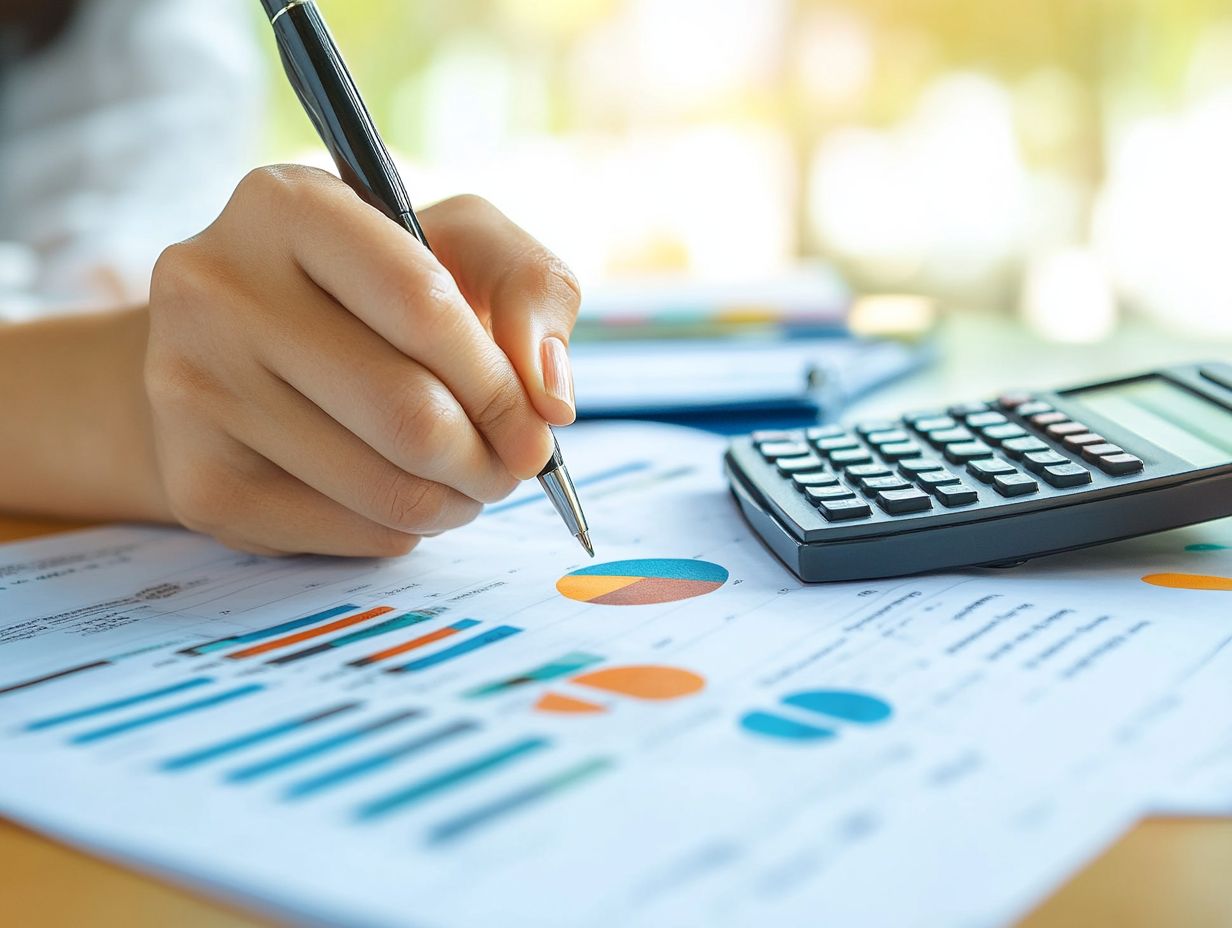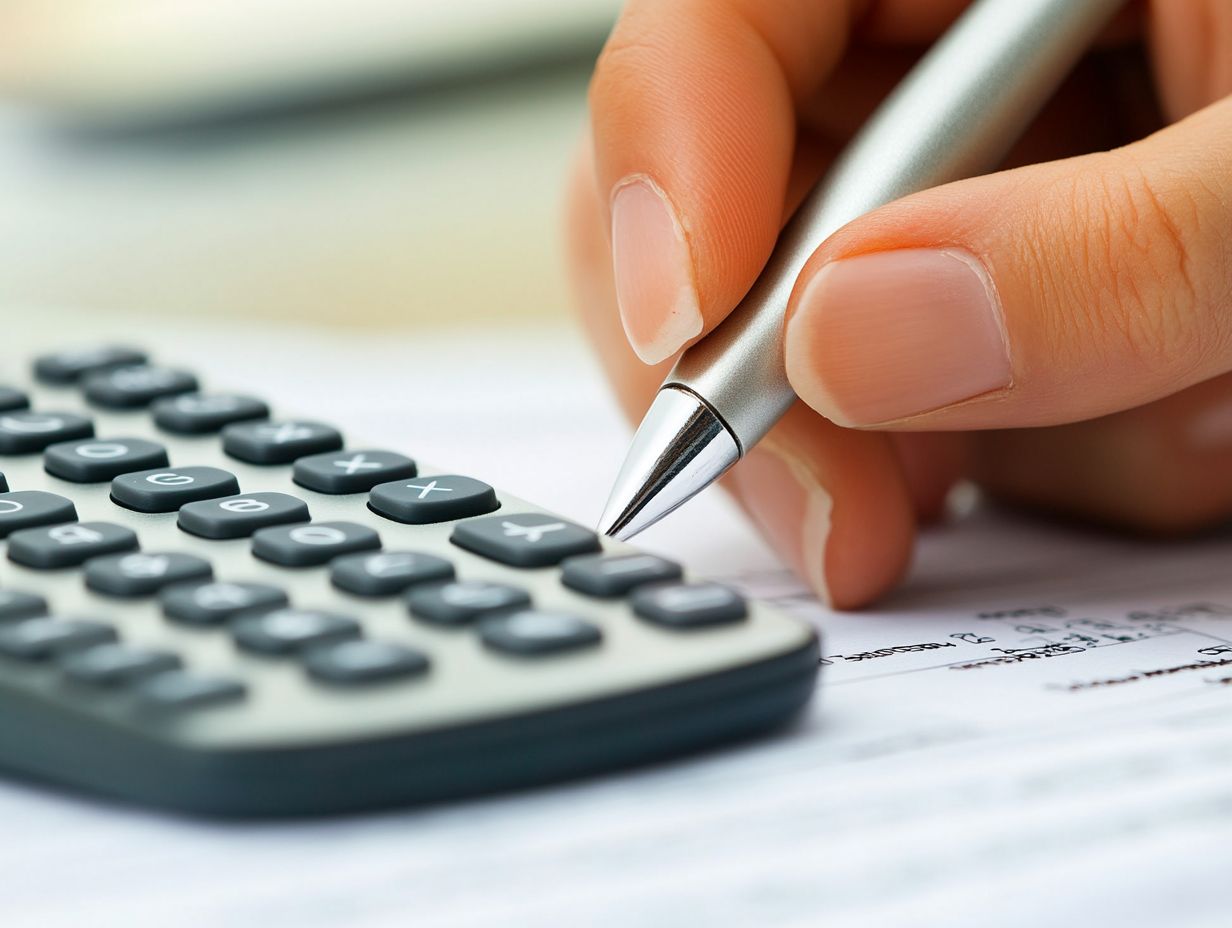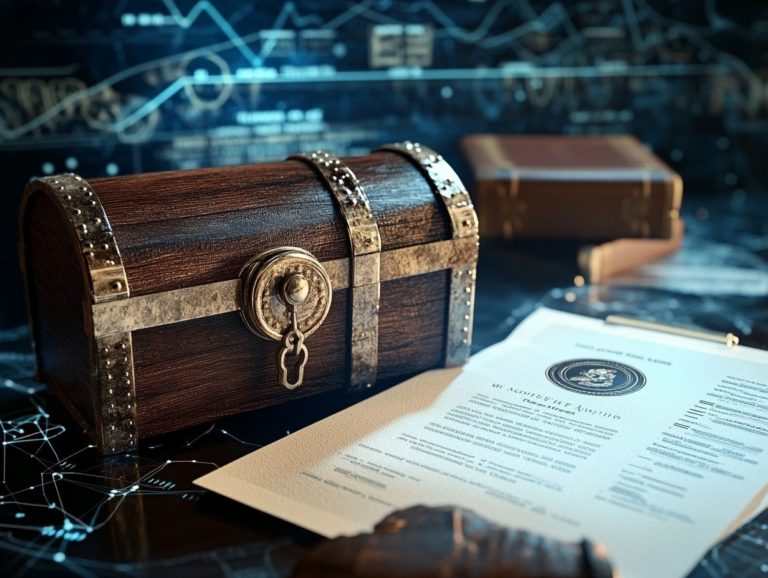Trade Secret Valuation: What You Need to Know
Navigating the realm of trade secrets can feel overwhelming, but understanding their value is essential for any business.
This article explores the fundamental aspects of trade secret valuation, clarifying what trade secrets are and discussing their importance. You’ll also learn how to protect and enhance the worth of your trade secrets.
Immerse yourself in this exploration to unlock the full potential of your intellectual assets.
Contents
- Key Takeaways:
- Understanding Trade Secret Valuation
- Why Valuation is Important
- Factors Affecting Trade Secret Valuation
- Methods for Valuing Trade Secrets
- Challenges in Valuing Trade Secrets
- Protecting and Maximizing Trade Secret Value
- Frequently Asked Questions
- What is trade secret valuation and why is it important?
- What types of information are considered trade secrets?
- How is the value of trade secrets determined?
- Can trade secrets be valued differently for different companies?
- How can a company protect its trade secrets during the valuation process?
- What are the potential benefits of conducting a trade secret valuation?
Key Takeaways:

Understanding the value of trade secrets is crucial for businesses to protect their competitive advantage. Factors such as market conditions, unique characteristics, and potential losses impact trade secret valuation. To maximize their value, businesses should protect them and focus on strategies to boost their worth.
Understanding Trade Secret Valuation
Understanding the details of trade secrets valuation is vital for any business aiming to shield its proprietary information and maintain a competitive edge in the marketplace.
Trade secrets such as customer lists, formulas, or other invaluable insights are essential elements of intellectual property that can substantially enhance a company s economic standing.
The legal protections provided by frameworks like the Uniform Trade Secrets Act and the Defend Trade Secrets Act enable trade secret holders to safeguard their proprietary methods from unauthorized use, ensuring their innovations remain secure.
What are Trade Secrets?
Trade secrets are your proprietary jewels, the insider information that gives your business a competitive edge over rivals. This includes everything from secret formulas and practices to customer lists.
These treasures remain confidential, allowing your organization to thrive in a unique market, making it tough for others to encroach. Unlike patents or copyrights, which require formal registration and have expiration dates, trade secrets can last indefinitely as long as you keep that information private.
Keeping your trade secrets safe is crucial for your business’s success! By diligently protecting them, you can ensure that your unique methodologies and insights are leveraged to their fullest potential, helping you maintain an advantage in a competitive landscape.
Why Valuation is Important
Valuing trade secrets is essential for businesses seeking to maximize their economic benefits and manage risk effectively. This understanding is particularly important in financial reporting and securing investments.
By recognizing the value of these intangible assets, you can make informed decisions that enhance your company s strategic positioning.
Benefits of Knowing the Value of Trade Secrets
Understanding the value of trade secrets unlocks numerous economic benefits, including bolstering your competitive advantage and refining your financial reporting.
By accurately assessing your trade secrets, you can craft strategic plans that align with your long-term objectives. For instance, if you re part of a technology firm that sees proprietary algorithms as key assets, you can make informed decisions about further investments in R&D or potential partnerships.
This can lead to enhanced investment opportunities, attracting interest from investors keen on companies with strong intangible assets. Take Coca-Cola, which famously safeguards its secret recipe. By leveraging this valuation, the company has cultivated brand loyalty and expanded its market presence, illustrating how a thorough understanding of trade secrets can elevate your business prospects.
Factors Affecting Trade Secret Valuation
Several factors influence trade secret valuation, including the unique characteristics of the proprietary information, prevailing market conditions, and the effectiveness of your security measures.
Take the first step now to evaluate your trade secrets and secure your business s future!
Unique Characteristics of Trade Secrets

Trade secrets have unique characteristics that make them valuable. They are confidential and provide economic benefits without the formalities of patents or copyrights.
Unlike patents, trade secrets allow you to keep proprietary processes, formulas, or customer lists confidential. This confidentiality enhances the enduring economic advantage these secrets can offer.
With no registration requirements, you can act quickly to protect your secrets. This makes them incredibly versatile tools in your strategic valuation.
As a result, trade secrets often become foundational assets that significantly contribute to your company s overall worth.
Market and Industry Factors
Market and industry factors significantly influence the valuation of trade secrets. Fluctuations in market demand and shifts in industry trends can directly affect their worth.
Understanding these dynamics is essential. For example, a surge in consumer interest in sustainable products can enhance the value of proprietary methods designed to improve eco-friendliness.
Overlooking these external conditions risks overvaluing or undervaluing your trade secrets, leading to missed financial opportunities. The landscape can change rapidly due to technological advancements or competitive strategies.
By keeping an eye on market trends and evolving consumer behaviors, you can effectively leverage your proprietary information to optimize its value in an ever-changing environment.
Methods for Valuing Trade Secrets
You have several methods for valuing trade secrets, such as the income approach, market approach, and cost approach. Each technique offers distinct insights into the true worth of these invaluable assets.
Income Approach
The income approach to trade secret valuation estimates the future earnings your trade secret is expected to generate. This gives you a comprehensive view of its financial potential.
This method relies on projecting expected cash flows produced by the trade secret over time. These cash flows can fluctuate depending on market conditions, competition, and the inherent value of the secret itself.
Analysts often use techniques like discounted cash flow (DCF) analysis, which estimates future cash flows and adjusts them for risk. This helps to determine the trade secret’s value.
The precision of these forecasts is crucial. Even minor deviations in estimates can lead to considerable differences in valuation. This highlights the need for diligent financial planning and thorough market analysis.
Market Approach
The market approach allows you to compare similar trade secrets within the industry. This helps establish a fair market value based on current conditions and pricing methodologies.
Market dynamics, including demand for innovation and competition in your sector, play a crucial role in shaping valuations. In times of heightened demand, trade secrets may command premium prices, while economic downturns could result in reduced valuations.
Understanding context is essential when determining value. Don’t miss out on the opportunity to capitalize on your unique assets!
Cost Approach
The cost approach to trade secret valuation focuses on the developmental expenses you’ve incurred in creating your trade secret. This lays a solid foundation for understanding its value.
You need to evaluate all costs related to research, development, and implementation. This will help you achieve a more objective valuation.
For instance, if you’ve developed a unique software algorithm, the costs involved in coding, testing, and deploying that proprietary technology are essential in determining its worth. Don t overlook expenses related to training personnel on the new system or securing any relevant patents; these factors are equally important.
By accurately capturing these costs, you can significantly enhance your valuation efforts. This ensures you safeguard your innovations while optimizing potential returns during transactions.
This structured approach gives valuable insights, especially in industries where intellectual property is key.
Challenges in Valuing Trade Secrets

Valuing trade secrets brings forth a set of challenges that can be quite formidable. The absence of public information makes it difficult to ascertain their true worth, and quantifying potential losses from unauthorized use or disclosure adds another layer of complexity.
Dealing with these issues needs careful thought and a smart plan.
Lack of Public Information
One significant challenge you face in trade secret valuation is the lack of public information. This can hinder accurate assessments and limit your ability to leverage competitive advantages.
Without sufficient external data, you may struggle to benchmark your innovations against market standards or determine fair pricing for your proprietary technologies.
To mitigate this issue, consider tapping into your internal data sources, such as past performance metrics and market research. Seeking insights from industry experts can also provide valuable context and enhance your valuation process.
By synthesizing this information, you can develop a more credible valuation framework, enabling you to make informed strategic decisions and better position yourself in the marketplace.
Difficulty in Measuring Potential Losses
Measuring potential losses from the theft or unauthorized use of trade secrets presents a formidable challenge. This complicates the valuation process and the associated risk management strategies.
You may find that organizations often grapple with this issue, as the intangible nature of trade secrets makes it nearly impossible to assign a straightforward monetary value.
There are various methods available for conducting risk assessments, including both qualitative and quantitative approaches. These can help you determine the likelihood of a breach and estimate its potential financial impact.
For instance, implementing a scenario analysis can offer valuable insights into different loss estimations based on historical incidents.
Consider case studies that reveal how companies facing legal consequences for inadequate loss measurements have endured not only financial setbacks but also significant reputational damage. This highlights the urgent need for thorough and proactive risk assessment strategies in your organization.
Protecting and Maximizing Trade Secret Value
Protecting and maximizing your trade secrets is essential, and it starts with a solid strategy. This involves establishing robust confidentiality procedures, implementing stringent security measures, and putting in place legal frameworks like non-disclosure agreements and licensing agreements.
Every part of your strategy plays a vital role in keeping your valuable information safe and sound.
Strategies for Safeguarding Trade Secrets
To safeguard your trade secrets, implement strong security measures. Establish clear rules to keep information private and use contracts to keep information secret.
Understand that legal tools alone aren t enough. Offer comprehensive employee training to foster a culture of confidentiality.
Ensure your team understands the value of sensitive information and the serious consequences of unauthorized disclosure.
Utilize technological solutions, like encryption and secure access controls, to reduce the risk of data breaches. Regularly review your policies to keep them aligned with changing laws.
By integrating these steps, you will create a strong barrier against threats to your intellectual assets.
Tips for Increasing Trade Secret Value
To enhance the value of your trade secrets, allocate resources wisely. Focus on strategic planning and continuous innovation to refine your techniques.
Identify key areas where your trade secrets are crucial. This helps align your business goals with development initiatives.
Regularly assess market trends and technology to prioritize vital information protection. Foster a culture of confidence among employees with training and engagement.
Establish clear policies regarding access and sharing of trade secrets. This enhances your protection efforts and strengthens your competitive edge.
Frequently Asked Questions

What is trade secret valuation and why is it important?
Trade secret valuation is the process of determining the monetary value of a company’s trade secrets. Understanding the trade secrets in mergers and acquisitions is important because trade secrets are valuable assets that can greatly impact a company’s financial standing and overall success.
What types of information are considered trade secrets?
Trade secrets can include a wide range of information such as customer lists, manufacturing processes, marketing strategies, and software codes. Essentially, any confidential information that gives a company a competitive advantage can be considered a trade secret.
How is the value of trade secrets determined?
The value of trade secrets is typically determined by looking at factors such as the cost of developing the trade secret, the potential profits it could generate, and the risk of it being leaked or stolen. Other intangible factors, such as the strength of a company’s intellectual property protections and the expertise of its employees, may also be taken into consideration.
Can trade secrets be valued differently for different companies?
Yes, the value of trade secrets can vary greatly depending on the industry, market conditions, and the specific strengths and weaknesses of a company. This is why it is important for companies to conduct their own individual trade secret valuations rather than relying on general industry standards.
How can a company protect its trade secrets during the valuation process?
During the valuation process, it is important for a company to work with experienced professionals who can maintain confidentiality and ensure that sensitive information is not leaked. Companies should also have non-disclosure agreements in place with anyone involved in the valuation process to protect their trade secrets.
What are the potential benefits of conducting a trade secret valuation?
Conducting a trade secret valuation can help a company better understand and manage its valuable assets. It can also provide valuable insight for potential investors or buyers, and help a company make more informed decisions about how to protect and leverage its trade secrets for future growth and success.






